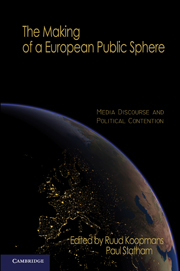Book contents
- Frontmatter
- Contents
- Tables
- Figures
- Contributors
- Acknowledgments
- Introduction
- Part I A European Public Sphere
- Part II European Public Debates
- Part III Mass Media
- 5 Making Europe News
- 6 The Media's Voice over Europe
- 7 Transnational Political Communication on the Internet
- 8 Framing the European Union in National Public Spheres
- Part IV Political Actors
- Part V Conclusion
- References
- Index
7 - Transnational Political Communication on the Internet
Search Engine Results and Hyperlink Networks
Published online by Cambridge University Press: 05 June 2012
- Frontmatter
- Contents
- Tables
- Figures
- Contributors
- Acknowledgments
- Introduction
- Part I A European Public Sphere
- Part II European Public Debates
- Part III Mass Media
- 5 Making Europe News
- 6 The Media's Voice over Europe
- 7 Transnational Political Communication on the Internet
- 8 Framing the European Union in National Public Spheres
- Part IV Political Actors
- Part V Conclusion
- References
- Index
Summary
Introduction
Whereas the visibility of political messages in the traditional media depends in a relatively centralized fashion on the selection decisions of journalists and editors, visibility on the Internet is an emergent property that arises from millions of small, decentralized decisions by Internet users. When using a search engine we click on certain results and not on others; when surfing the Web we follow one offered hyperlink or another; and if we have a Web presence of our own we may establish links to a few other Web sites, but not to many others. As a result of many such small actions by millions of users, visibility will become distributed unequally on the Internet, because some sites appear prominently among search engine results and others not, and some sites are on the receiving side of many hyperlinks while others receive none. The question that we address in this chapter is how the structure of political communication on the Internet compares with what we find in the traditional media.
- Type
- Chapter
- Information
- The Making of a European Public SphereMedia Discourse and Political Contention, pp. 171 - 194Publisher: Cambridge University PressPrint publication year: 2010
- 18
- Cited by



